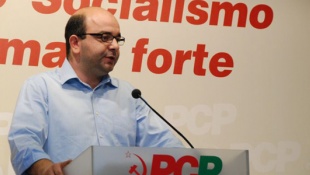The Central Committee of the PCP, having met on February 22nd, analysed the results of the early general elections and assessed the political framework that has emerged from them. It established the main initiatives for the PCP's immediate activity and the measures to strengthen the Party, as part and parcel of the general campaign “Yes, a stronger PCP is possible”.
1. The Central Committee of the PCP stresses and highlights that last Sunday’s elections resulted in the achievement of two of the PCP's main goals: an increase in the Broad Democratic Coalition (CDU)'s number of votes and electoral expression, and the confirmation, in the ballot box, of the defeat of the right-wing parties.
2. The CDU's result – which was a positive increase in the number of votes in all districts of Mainland Portugal and in the Autonomous Regions [of Madeira and the Azores] – is an important element that should be stressed. It is particularly meaningful that the CDU has become the third largest electoral force and has strengthened its parliamentary representation, increasing the number of its elected Members of Parliament (MPs) from 12 to 14. Despite the loss of an MP in Setúbal (albeit with a larger number of votes), it should be highlighted that one more MP for Lisbon, a second MP for Oporto and an MP for Braga were elected.
The CDU’s result – 7.57% and more than 432 thousand votes, an increase of around 54 thousand votes - represents an important reversal of the electoral losses registered in past elections, thus countering the idea of an irreversible decline that some hastily forecast for the PCP and the CDU.
The CDU’s result, although definitely falling short of what is needed to ensure a more solid contribution for a real change in the country's political life, is, in itself, a stronger factor asserting the CDU's future role and activity.
To each and every Portuguese man and woman who cast their votes for the CDU, the Central Committee of the PCP assures that now, as in the past, it will honour and stand by its pledges. We guarantee an activity in the Assembly of the Republic [Parliament], and outside it, in defence of your interests, rights and aspirations.
3. The defeat of the right-wing parties confirms the correctness of the struggle against the policies of the past governments and of the demand for early elections as the first step to put an end to the destructive activities of the PSD and CDS/PP governments.
Those parties' defeat, and in particular the extent of this defeat – with one of the lowest results ever for the PSD, a drop in the CDS/PP's vote, and a loss of more than 12 percentage points by both parties combined, who have scored the lowest ever election result by the right [wing parties] in our country – confirm the deep discontent and erosion of social support that the policies of the Durão Barroso, Santana Lopes and Paulo Portas governments created during the past 3 years among large sectors of the Portuguese people.
Whatever the political solutions and options that may emerge from these elections, the Central Committee of the PCP extends its greetings to all the working men and women, all Portuguese men and women who, through their struggle, contributed to the fight against the PSD and CDS’ disastrous and unjust policies and created the conditions to isolate, weaken and ultimately defeat the right-wing parties.
4. The absolute majority won by the Socialist Party (PS), which essentially capitalised the vast discontent against the PSD governments and benefited from the dynamics induced by the false notion that this was an election of candidates for Prime Minister, represents a less positive and less reassuring factor for the necessary change that the country's situation demands.
Even though it is true that thousands of voters decided to cast their vote for the PS motivated by the wish to remove the PSD and CDS/PP from office and ensure a political change, the final result, as the PCP has repeatedly stressed, is far from guaranteeing the political turnabout that many aspire to.
Although it is necessary to wait for the government program and composition that the PS will present, the fact that it has a free hand and does not need to seek convergences and agreements to its left, is a worrying sign of the essential options and guidelines that it will undertake, frustrating the expectations of the majority of the Portuguese people.
5. In response to the loud call for change that these elections results clearly reflect, the PCP will act in the Assembly of the Republic, and outside it, to materialise the desire for change that was expressed by the Portuguese people.
In coherence with its activity and electoral program, the Central Committee of the PCP reaffirms its firm guarantee to pursue a course of action in defence of the interests of the workers and of social rights, for higher living standards for the Portuguese people, in defence of the national productive apparatus and to assert a sovereign foreign policy of peace and cooperation.
Honouring its pledges to the country and to all those who gave us their trust, the PCP will, at the opening of the Assembly of the Republic, present bills for the repeal of the labour package [of legislation], for a midterm increase in pensions and the national minimum wage and to depenalize abortion, as well as draft resolutions regarding the activation of the safeguard clause [on the treaty which] liberalises [the trade in] textiles and the replacement of the Stability and Growth Pact with a compromise that enables a policy of economic and social development of the country and a real convergence with the European Union. Moreover, during the next budget discussion, we will present proposals for a greater fiscal justice.
6. The results obtained by the BE (Left Block), mark a significant electoral progress, and seem to confirm, taking into account the CDU’s electoral growth, that this party benefited mainly from the votes of many voters who were discontent with the right-wing parties and with the PS. Its vote may also correspond to a wish for change by many voters who, for several reasons, did not yet decide to make the more coherent and effective choice that a vote for the CDU would surely represent.
The Central Committee registers as particularly negative the fact that the BE's first publicly announced challenge to the PS is the calling of a new referendum on abortion, which, by the way, coincides with the PS' statements during the electoral campaign. This proposal, instead of the demand to adopt, in Parliament, a Law to de-penalise abortion, within the framework of a clear and unequivocal parliamentary majority that can ensure its approval, gives new room, which the elections had taken away, to the right-wing parties and their backward views and goals.
7. The Central Committee of the PCP greets the thousands of Party and JCP members who, side by side with the activists from the Ecological Party - "the Greens”, from the Democratic Intervention [association] and with independents, contributed through their generous dedication and irreplaceable activity to spread throughout the country a word of confidence in the possibility of a new course in national political life.
The campaign of awareness-raising and mobilisation of wills, which week after week the CDU undertook, is already, together with the results achieved, a priceless gain in asserting a force that identifies itself with the interests of the workers and the people, that understands and conveys their concerns, that shares their dreams for a better and more dignified life.
In the life which continues after this 20th February, the results obtained by the CDU, and especially the current of support for its proposals and activity, are a solid factor of trust and dedication to the work and struggle for a new policy, in defence of the interests of the workers and for a more just and sovereign Portugal.
8. The Central Committee stresses the need to continue the struggle for a foreign policy that defends national sovereignty and independence, guided by the values of peace, of cooperation and friendship among peoples. The end of the ruinous policy of submission to the European Union and NATO and the shameful submission to imperialism’s aggressive strategy is a fundamental condition for the solution of the severe problems of the people and the country.
The Central Committee draws attention to the trip by the US President to Europe, which due to the circumstances surrounding it and its announced goals, stirs deep concerns. Proclaiming a wish to “clear up the tensions” between the US and “Europe” created by the war of aggression against Iraq and to strengthen “transatlantic ties”, the Bush Administration aims to neutralise the reservations and opposition to its aggressive policy and, with the strengthening of NATO and the help of the great powers of the European Union, continue its policy of war and planetary hegemony.
Under the cynical cover of “war against terrorism” and, now, the “spreading of freedom”, the US, while trying to consolidate its occupation of Iraq and neutralise Palestinian resistance, tries to re-launch its strategy of the “Greater Middle East”, continuing its manoeuvres to destabilise and openly threatening countries like Iran, Syria and the D.P.R.
Korea. After preparations by Rice and Rumsfeld, Bush’s visit, and in particular the NATO and US-EU Summits, seek to solve the difficulties which the US faces in Iraq, by-passing the real contradictions and rivalries which oppose the two
imperialist blocs, USA and European Union, and draw up, according to Bush, “a vast agreement for a new transatlantic strategy” aimed against the workers and the sovereignty of the peoples.
This aim will falter with contradictions and meet the resistance of the peoples, including the Portuguese people. A new government which interprets the real meaning of the February 20 ballot cannot forego a stand against interventionism and war and must refuse, in Iraq as in Afghanistan and other parts of the world, Portugal's involvement in the aggressive strategy of imperialism.
With this in mind, the CC of the PCP calls on the workers and the Portuguese people to demonstrate on the occasion of the second anniversary of the launching of the war of occupation of Iraq, demanding the withdrawal of the occupation forces and the return of sovereignty to the Iraqi people.
9. The Central Committee of the PCP stresses the significance of March 8th. International Women’s Day, whose 30 years of commemoration under freedom take place this year, is an important act of assertion of women’s rights.
The CC of the PCP stresses the importance of giving concrete expression, in our activity and struggle, to the problems, claims and demands which concern and affect the workers and the Portuguese people.
The Central Committee calls for, as more immediate tasks, the engagement of all organisations and militants in giving a greater and more decisive attention to the preparation of local government elections. A decisive attention and commitment to ensure that the present dynamic of support and the current of affection for the CDU’s proposals and projects may continue and broaden in the elections of this forthcoming [month of] October.
The Central Committee stresses the need to give a new thrust to materialise the guidelines of the 17th. Congress for a stronger Party. It stresses the need to carry out a vast number of plenary sessions to debate the electoral results
and the Party's tasks, appeals to the mobilisation and participation of the [Party] organisations in preparing the Avante! Festival, to be held on September 2nd. 3rd. and 4th. In addition, it stresses the importance of the commemorations of the 84th anniversary of the Party, with events at all levels, in a strong assertion of the Portuguese Communist Party, of its proposals, values and project.


